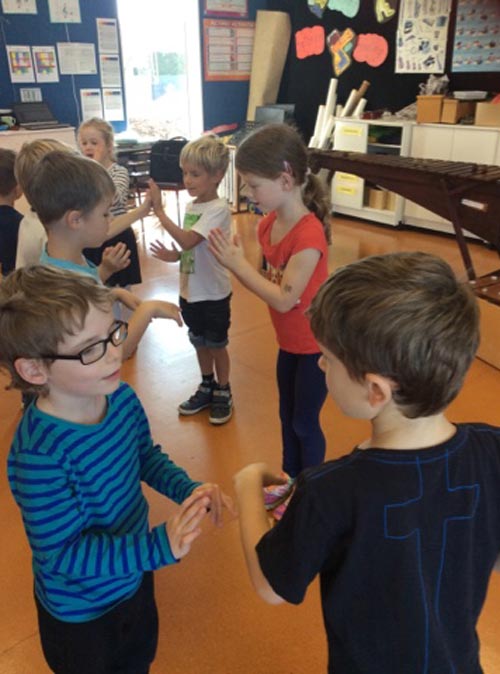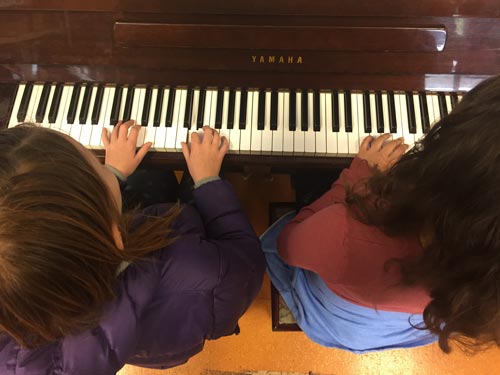Music

Class Music lessons
At Pt Chevalier School we place an emphasis on the creative arts. Through parent donations, the school BOT funds a full time Music teacher, Rose Alexander, to teach music and movement to all children in the school. Each class receives a weekly lesson of 45 minutes (30 minutes for Year 1) throughout the year. Lessons follow the guidelines set out in the New Zealand Arts Curriculum.
The music programme is based on the ideas of German composer Carl Orff (1895–1982), as outlined in the approach often referred to as Orff Schulwerk. In a nutshell, it is music-making in its most elemental form – how children play (moving, singing, playing hand games, dancing, exploring, creating, having fun together). It is a process-driven approach which sees language, music and movement intertwined to provide opportunities for creative music-making for all children, irrespective of previous skill levels.
The Orff approach to music education involves singing, body percussion, playing a variety of tuned and untuned instruments, movement, dancing and speech, neatly summarised by the local Orff association – Orff New Zealand/Aotearoa (ONZA) – in three words: Sing, Move, Play. For more information on the Orff approach to music education, visit the ONZA website.
Junior focus (Years 1–3) is on developing the singing voice through the use of sol-fa; introducing playing techniques and awareness of musical elements through use of percussion instruments; using movement as integral part of musical expression and creativity. There is less emphasis on formal aspects of notation – Orff promotes a ‘mother-tongue’ approach to learning how to read music. Aspects of the Kodaly method of music education are employed with use of sol-fa and hand signs, pitch notation using two-line stave, lots of singing, and introduction of rhythm notation concepts.
Senior focus (Years 4–6) continues with developing understanding of elements of music, instrumental and vocal skills. There is a strong emphasis on world music with songs, dances and games from other cultural traditions used to develop musicianship skills and confidence in performing and creating. There is an increasing focus on improvisation and composition, and developing the appropriate skills to be able to notate our new creations.
Each term there is a specific focus area, which may include:
- instruments and music from around the world
- Instruments of the orchestra
- New Zealand Music Month (May)
- Composer or music style study (Mozart, Beethoven, Beatles / rock ’n’ roll, Gershwin / jazz & blues)
- Taonga pūoro (Māori musical instruments)
- Music for a purpose (celebrations, commemoration)
- Music and story (film music, mood music, music that tells a story)
Sharing our music in the community
We have a number of opportunities during the year to participate in local music festivals. These include the annual ONZA Marimba Festival, the NZ Ukulele Trust’s ukulele festival, and the APPA Music Festival. See below for more details.
For more information regarding the ukulele festival, refer to NZ Ukulele Trust’s website.
To get a taste of an APPA Music Festival performance, see the following YouTube clips from previous years:
- Chris Powley singing ‘You raise me up’ with the massed APPA choir, 2012 – watch on YouTube.
- The massed APPA choir singing Toto’s ‘Africa’ – watch on YouTube.
- The massed APPA choir, with special guests Kiwi music icons Eddie Low, Suzanne Lynch and John Rowles, singing ‘Pokarekare ana’ – watch on YouTube.
- Ray Woolf joins the APPA massed choir & ukuleles for ‘Bring me sunshine’ – watch on YouTube.

Individual and group music tuition
Children have the opportunity to learn instruments through Lewis Eady Music School which operates during school hours here at school. Each year we have between 120-150 children who choose to learn an instrument either individually or in groups (maximum 3 per group). Instruments on offer include: guitar, piano, keyboard, ukulele, violin, vocals, drum kit and recorder. Brass and woodwind (saxophone, flute, clarinet) are also available if there is sufficient demand.
Details of the programmes on offer, costs and online enrolment forms are available on the Lewis Eady website.
